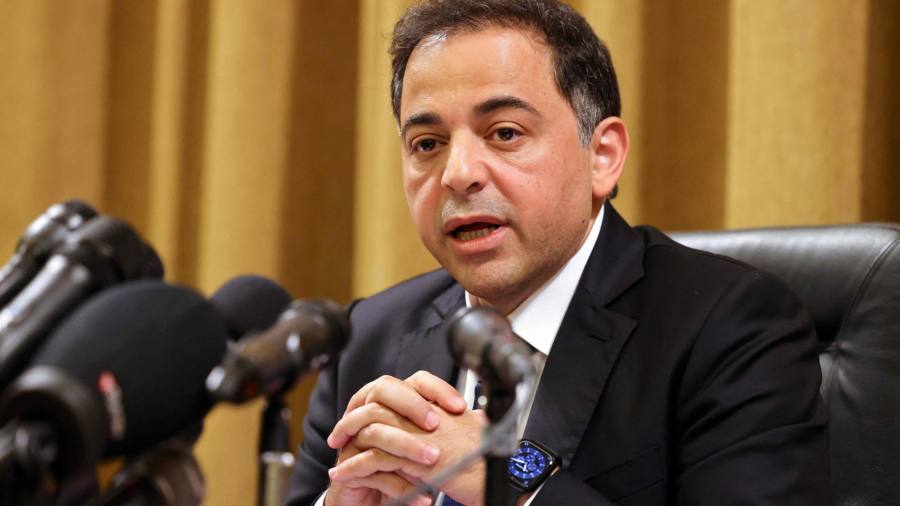Receive free Lebanon updates
We’ll send you a myFT Daily Digest email rounding up the latest Lebanon news every morning.
The first deputy governor of Lebanon’s central bank has confirmed he will take over as interim chief after governor Riad Salameh’s term ends later on Monday.
Wassim Mansouri will run the Banque du Liban until a permanent successor is found.
Although the country is in the throes of an economic meltdown, Lebanon’s political leaders failed to appoint a permanent replacement in time for the handover.
Lebanese law mandates that the central bank’s first vice-governor must take over in the absence of a permanent chief. Mansouri, along with the three other deputies, have been reluctant to take the helm without policy guarantees from the country’s deeply fractured political class.
In a press conference announcing his decision, Mansouri urged the government to pass urgently needed laws to deal with Lebanon’s deep economic crisis, saying this was the country’s “last chance”.
“Among these laws are the 2023 budget, capital controls and the restructuring of the banking sector,” Mansouri said. “There will be no monetary recovery without these laws.”
He said the BdL, parliament and the caretaker cabinet would need to work together to forge a comprehensive recovery plan, including talks on unifying and floating the local currency. Since the start of the crisis, Lebanon has had multiple exchange rates that govern different transactions.
“To politicians, I ask that you no longer link monetary matters to political manoeuvring,” he said.
“We are facing a crossroads,” Mansouri said, adding that he would not approve any new government financing which was “outside the legal framework”.
Mansouri, a lawyer, is a Shia Muslim who was appointed in 2020 under Lebanon’s sectarian power-sharing system, which governs top government posts. The rules mandate that the BdL governor must always be a Maronite Catholic, meaning Mansouri cannot take over permanently.
Since the start of the economic crisis in 2019, the Lebanese pound has lost more than 98 per cent of its value against the dollar, impoverishing three-quarters of the population.
The deputy governors put forward an ambitious six-month plan earlier this month that hinges on widescale policy shifts as well as reforms that political leaders have avoided implementing for nearly four years.
Under the plan, the BdL would implement drastic restrictions on how and when it lent to the government and would phase out a controversial currency exchange mechanism implemented by Salameh to try to steady the Lebanese pound.
The plan elicited a mixed response from MPs and members of Lebanon’s fractious ruling class, many of whom have resisted calls for economic and political reforms since the start of the crisis. Approving the required laws and reforms within that timeframe will therefore be difficult, three senior politicians told the Financial Times.
For years Salameh, who ran the BdL for three decades, was credited with stabilising an economy battered by the 1975-1990 civil war. But in recent years he has been dogged by allegations of corruption and financial mismanagement and is facing judicial investigations at home and abroad. He has denied any wrongdoing.
Salameh’s critics say his policies helped put the country on the path to ruin. Chief among these was his decision to continuously finance the government despite its profligate spending. He also engineered financial programmes to keep the system afloat after US dollar remittances from the country’s large diaspora began slowing in 2015 amid instability in Lebanon and war in neighbouring Syria.
When the financial system began to collapse in 2019, the currency peg unravelled, revealing losses of about $70bn in the financial sector and leading the country to default on its debt.
The World Bank in 2022 described the financial crisis as a “deliberate depression orchestrated by the country’s elite that has long captured the state and lived off its economic rents”.
Read the full article here




